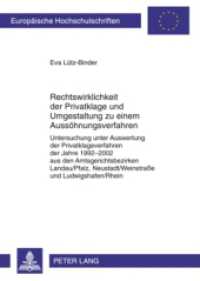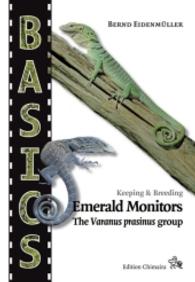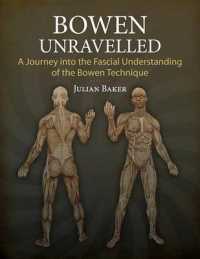Full Description
This timely and comprehensive book delves into this complex and multi-faceted phenomenon of migration and illuminates its diverse facets and its profound influence on societies across the globe.
In an era marked by unprecedented global mobility, as people move across continents in search of better lives, it has never been more crucial to explore the intricate tapestry of human migration. This volume examines the social, economic, and cultural dimensions of migration, uncovering stories of migrants and the transformative potential and hardships their journeys often entail. The twelve chapters in this book demonstrate the scale of challenges and opportunities that lie ahead. The contributors examine policy, practice, research and professional development across various international, European and national settings, all viewed through the perspective of career guidance and counselling.
With a new chapter, conclusion, and a revised introduction, this book will be of value and interest to students, researchers, teachers, policymakers, guidance and counselling practitioners who have an interest in migration, human psychology, social science, youth work, mental health, counselling, education, and community development. The other chapters were originally published in the British Journal of Guidance and Counselling.
Contents
Introduction—Migration: Towards a more inclusive society 1. The effect of a career development programme based on the Hope-Action Theory: Hope to Work for refugees in British Columbia 2. The cultural preparedness model of aspiration and engagement: understanding the dynamics of integration 3. Where are you from?' Identity as a key to parenting by 1.5 generation Korean-New Zealand migrants and implications for counselling 4. Considering boundaries when doing therapeutic work with people who are seeking asylum: a reflective case study 5. Ready or Not - Here We Come! Is Europe Ready for Career Guidance in an Intercultural Society? 6. Factors that impact the sociocultural adjustment and well-being of Syrian refugees in Stuttgart, Germany 7. A job-seeking competency model for North Korean defectors who are college students in South Korea 8. Families left behind at the source of migration: implications for career guidance practitioners 9. Learning Engagement as a target for early interventions: a qualitative study of first generation migrant adolescents in Finnish Secondary Schools 10. A comparison of mental health literacy, attitudes, and help-seeking intentions among domestic and international tertiary students Conclusion: Implications for career guidance and counselling







